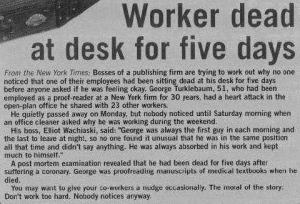To some extent, perfectionism is a valuable attribute in an attorney. Exacting standards and an almost obsessive attention to detail help you to do a good job for your clients, keeping them and yourself out of trouble.
I say “to some extent,” however, because research shows that perfectionism can lead to burnout, anxiety, and even depression.
You can argue that there’s too much at stake and, therefore, no room for error. You can’t take any risks with your work. But, as I’ve said before, life (and the practice of law) isn’t about the complete elimination of risk, it’s about the intelligent management of risk.
There are things you can do to maintain your wellbeing while staying faithful to your high standards. Like checklists, that tell you when you’ve done the work that needs to be done, and self-imposed deadlines that force you to “turn in your homework” even though you might want more time.
Mistakes happen. But most of the time, most of what you do is “good enough” and good enough is usually good enough. Err on the side of “overly cautious” or “painstakingly thorough,” but do what you have to do to let things go.
Repeat after me: “Done is better than perfect”.
One area where you cannot afford to be a perfectionist, however, is in managing your practice.
You can’t wait for the perfect marketing solution, you have to run with things and see how they work. Marketing is messy. Somethings work, some don’t. Sometimes you get it right, sometimes you lose your shirt.
Similarly, you can’t refuse to delegate work because “nobody can do better” or because someone might make a costly mistake. If you insist on doing everything yourself, you will never grow.
You will work more than you have to and achieve less than you could. And you’ll also go home exhausted.
Earn more, work less. Here’s how











